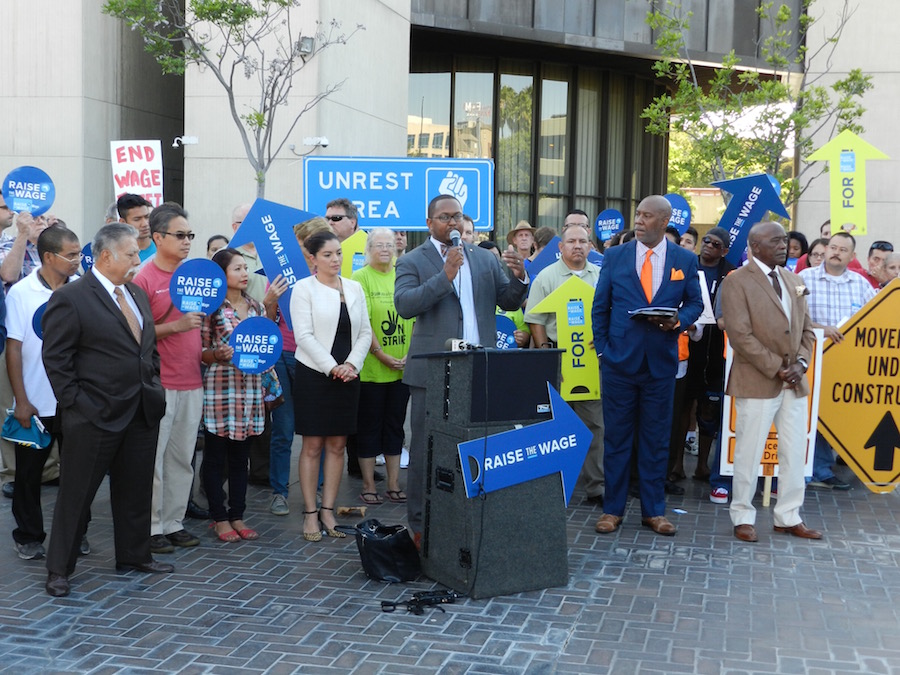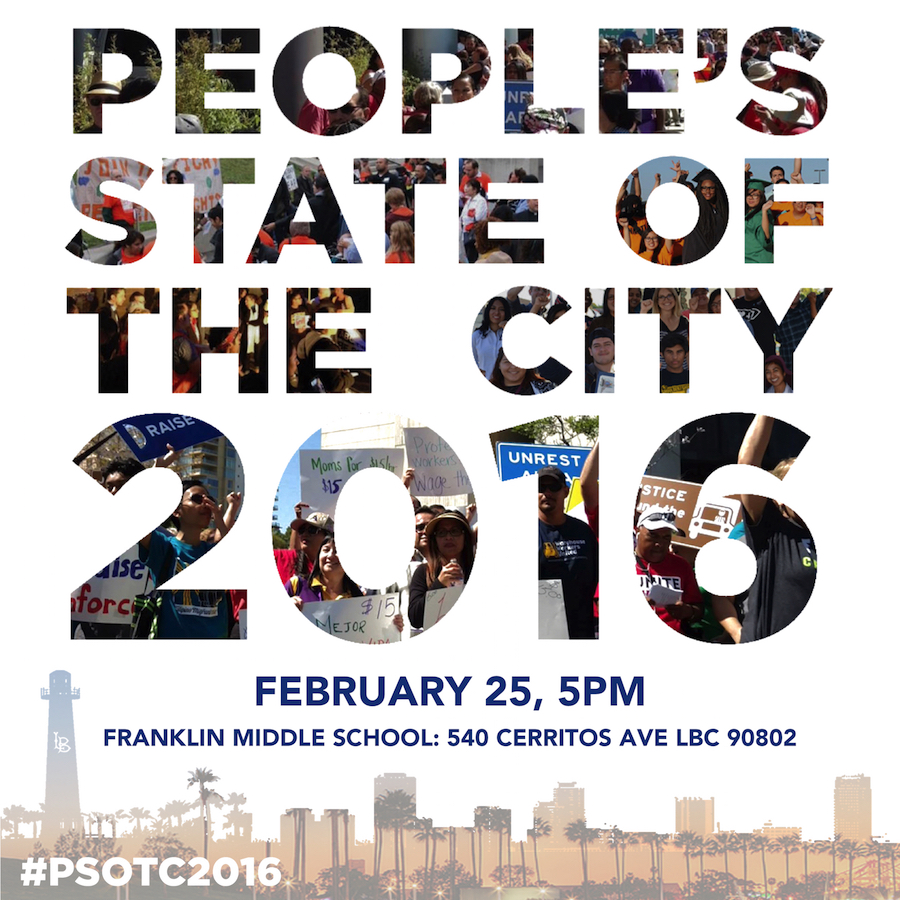
Long Beach Rising and its coalition members were a big presence in the fight for a higher minimum wage. Photo by Jason Ruiz.
When the fifth annual People’s State of the City (PSOTC) makes its return to the Second District inside Franklin Classical Middle School Thursday night, it will do so with the hope of continuing the momentum of past events and setting a new standard for community engagement in elections. The fifth installment of this resident-centric town hall will highlight the struggles still facing a city with three of its more impacted council districts up for election.
Last year’s site—Stephens Middle School—was chosen to highlight the public safety needs in the city. The school was the site of a fatal stabbing of Cabrillo High School student just over a year ago. James Suazo, a hub coordinator for Building Healthy Communities, said that, like last year, the decision to place this year’s event was calculated and meaningful, as the second district is one of those three districts that could see a new council member representing it.
“We chose this location specifically because we have a very important council district up for election and that’s the second district,” Suazo said. “So we wanted to highlight the involvement there in that community.”
Suazo’s group is part of a larger coalition called “Long Beach Rising” that includes organizations representing a large swath of ethnic minorities throughout the city, including those of Cambodian, Hispanic and Filipino descent. But it’s also included past council members like Tonia Uranga, current council candidates like Jeannine Pearce and local clergy associations.
Last year’s event was well-attended by elected officials, either personally by the representative or by members of their office. However, the only member that spoke during the 2015 People’s State of the City was Seventh District Councilmember Roberto Uranga, whose district served host to the event.
“When you look at a community that’s succeeding, you have to take a pulse of that community,” Uranga said during last year’s event. “And how do you take the pulse of a community? You do it by having events like this. I hope that we can report out some of the very positive things that we’re doing, but even better, very positive things that we’re going to do, where we’re going to take the city in the future.”
 By that measure, the council seemingly took notice of the demands being put on the table by residents at the event. Measures to add greenery to the West Side—including discussions to turn the Terminal Island Freeway into a greenbelt—and ordinances aimed at dealing with wage-related issues have all been passed since the 2015 PSOTC.
By that measure, the council seemingly took notice of the demands being put on the table by residents at the event. Measures to add greenery to the West Side—including discussions to turn the Terminal Island Freeway into a greenbelt—and ordinances aimed at dealing with wage-related issues have all been passed since the 2015 PSOTC.
The fifth annual event will again focus on the marginalized members of the Long Beach community, with the aim of highlighting their stories and bringing their struggles to the consciousness of elected officials and their fellow Long Beachers. Environmental issues, economic development and access to quality education are all on the docket, as well as a general call to action for better engagement in the voting process.
Suazo said it’s just as important for members of the community to come together and share their stories as it is for them to come together to form solutions. That community involves those elected to serve, and Suazo maintained that invitations have been extended to all people already in office, as well as those seeking it out in this year’s election.
He will present a portion of the night’s program, focusing his efforts on highlighting the opportunities the city has and the obstacles facing it in realizing them. He’ll share the stage with local artists who will act out skits dealing with education access, as well as a sharing time on stage with a local poet.
Suazo said the night is just as much about consciousness as it is about courage. Problems can’t be addressed unless they’re brought to light, and sometimes the problems are so severe they require courage from both those suffering from them and from those who are charged with making policies to help remedy them, Suazo said.
“We don’t just want services and band-aid solutions to small problems, we want larger change that’s going to be sustainable and is positive for our community,” Suazo said.
The slow burn of some of the broader issues the coalition has fought for—a higher minimum wage, hotel workers’ rights and wage theft protection—have seen progress in leaps and strides over the past year. Having that tangible progress is helpful, Suazo said, for engagement on the coalitions end on a day-to-day basis. Still, their aim is to continue to push forward, stressing the interconnection of issues in this city and to point residents in the direction where a solution may be found.
“This year we’ll really be looking at the environment, poverty, police violence and community safety but also displacement and access to opportunity for young people,” Suazo said. “Because all of those issues, even though they might seem like they’re separate, if we’re talking about the environment we need to pay attention to what’s happening with the local economy and the jobs. If we’re talking about education, we need to look at what kind of access we’re creating for all young people regardless of their income status.”

